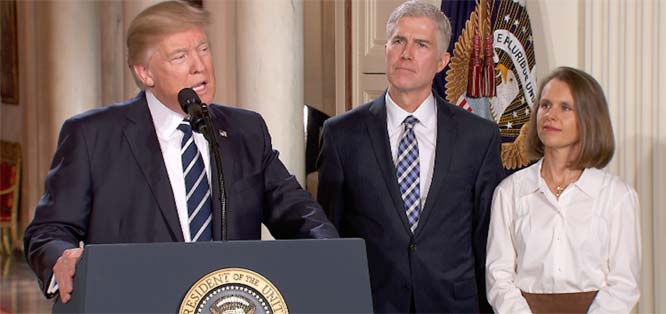
To review the left's reaction to Supreme Court nominee Neil Gorsuch is to infer he's the spawn of Dracula -- a cruel and bloodless beast who shrinks from the light and plays havoc with history.
Among the many distortions: Gorsuch is against clean water, consumers, women's health, dying people and workers. The liberal Alliance for Justice declares him worse in some ways than Justice Antonin Scalia, whose seat Gorsuch would assume if confirmed. People for the American Way claims he's an ideologue "far outside of the judicial mainstream who has a record of warping the law to serve the powerful over the interests and constitutional rights of ordinary Americans."
Or, one could argue that he is courageous in protecting the people and the Constitution by adhering to text and original intent without concern for his popularity.
As background, Gorsuch has served since 2006 on the Denver-based 10th U.S. Circuit Court of Appeals, where his reputation as a brilliant jurist and writer gained national attention. A graduate of Harvard Law School, he also earned a doctorate from Oxford in legal philosophy. His dissertation was on euthanasia, which has raised flags among those fighting for death-with-dignity laws. If Gorsuch opposes assisted suicide for the terminally ill, goes the thinking, then he must also oppose a woman's right to terminate a pregnancy.
Gorsuch has said that human life has intrinsic value and that no other human has a right to destroy another's, which seems on its face to be manifest. He has never written or ruled specifically on abortion, so this remains a hazy correlative. He is, indeed, an originalist, as was Scalia, and his rulings might not differ much from his conservative predecessor's.
Fundamental to his approach is the understanding that legislatures, and not courts, should create laws. This position also extends to administrators and bureaucrats. Liberals have sometimes preferred to fashion law through the courts, rather than navigate the legislative process, which is burdensome, stubborn and slow. It's so much easier to create law in the courts and let people adapt.
This view would seem almost Trumpian but for his selection of Gorsuch, who is of the opposite inclination. After two dizzying weeks of confounding (Mexico), outrageous (travel ban) and absurd (Australia) first acts, Trump's naming of Gorsuch brought a welcome pause. Yes, it was showmanship -- prime time and all that -- but, seriously, who cares? It was far and away the most presidential performance we've thus far witnessed, notwithstanding Trump's nearly separating Gorsuch's arm from its socket during a handshake.
Should Gorsuch be approved, the court's composition obviously doesn't really change. The balance would remain the same, with Justice Kennedy, for whom Gorsuch clerked, as the swing vote. It's the next seat for which Democrats should save their fire, lest they be viewed as intractable as the Republicans were the past eight years. No one wins this war.
Democrats are entitled to their indignation over Republicans' refusal to consider Merrick Garland, President Obama's choice for Scalia's seat. But their energies will be spent for naught -- and they could do far worse. Besides, there's no real knowing how a justice will rule. Philosophical temperament is a factor, but it's not the only one. Individual cases present facts and circumstances that can lead to unexpected conclusions. One needn't look far for examples.
Chief Justice John Roberts shocked conservatives when he ruled favorably on the Affordable Care Act, but his decision was double-edged. By deciding that the penalty in Obamacare, intended for people who refused to buy insurance, was really a tax, Roberts also exposed the dishonesty in the Obama administration's presentation of the health care plan. Throughout the legislative process, the administration insisted that it was not a tax.
Though cold comfort to conservatives, the ruling bolstered arguments that Obamacare was based on false pretenses and the assumption, as one of the law's architects later boasted, that people would be too stupid to know the difference.
The upcoming debate should be scintillating theater as it strikes at the heart of a judge's role. Gorsuch has made himself clear on this. In a 2016 concurrence, he wrote: "Ours is the job of interpreting the Constitution. And that document isn't some inkblot on which litigants may project their hopes and dreams for a new and perfected tort law, but a carefully drafted text judges are charged with applying according to its original public meaning."
I wouldn't wish on anyone the task of proving that wrong.


 Contact The Editor
Contact The Editor
 Articles By This Author
Articles By This Author